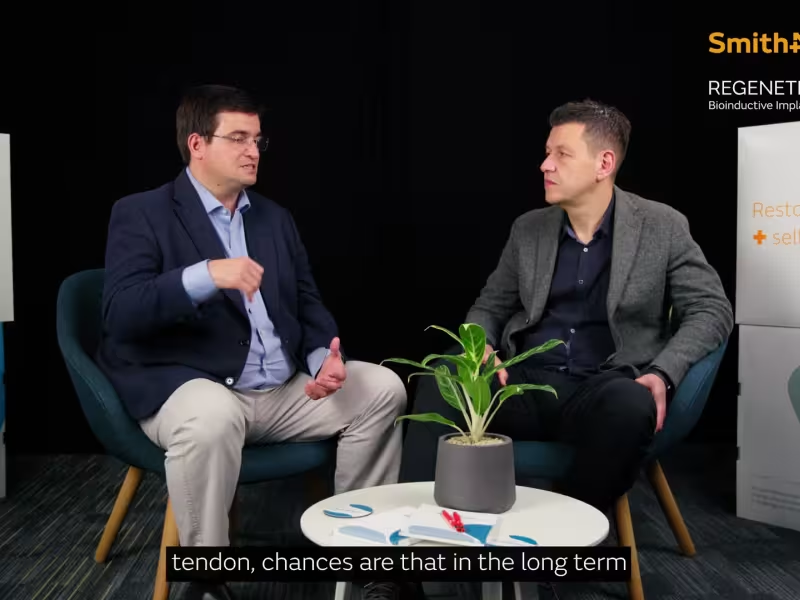
SHERIDAN, WYOMING – May 7, 2025 – A new randomized controlled trial (RCT) has revealed significant advancements in rotator cuff repair, showing that augmentation with the REGENETEN Bioinductive Implant can substantially reduce the risk of re-tears, offering hope for better outcomes in patients undergoing full-thickness rotator cuff repairs. The study's findings have the potential to set a new standard of care in orthopedic surgery.
Understanding the Challenge of Rotator Cuff Repairs
Rotator cuff repairs are among the most commonly performed orthopedic procedures, with an estimated 750,000 surgeries taking place annually in the United States alone. However, the procedure is not without its challenges, as up to 25% of patients experience re-tears, often leading to additional treatments and prolonged recovery times.
While traditional repair techniques have focused on the mechanical aspects of tendon healing, a growing body of research highlights the importance of addressing the biological factors that contribute to failed healing. Over the last decade, rotator cuff augmentation has emerged as a promising solution, aimed at addressing both biomechanical and biological challenges. Until recently, however, high-level evidence supporting its effectiveness was limited.
Breakthrough Study: The REGENETEN Bioinductive Implant
Led by Dr. Miguel Ruiz Ibán, Head of the Shoulder and Elbow Unit at Hospital Universitario Ramón y Cajal in Madrid, Spain, a recent study published two-year results comparing standard rotator cuff repairs with and without augmentation using the REGENETEN Bioinductive Implant. The trial, which included 124 patients with medium to large full-thickness rotator cuff tears (1–4 cm), provides compelling evidence that the use of the REGENETEN Implant offers significant advantages in improving tendon healing.
Methodology and Key Findings
In the trial, patients were randomly assigned to one of two groups: one receiving traditional rotator cuff repair (Control group) and the other receiving the same repair augmented with the REGENETEN Bioinductive Implant (REGENETEN Implant group). There were no significant differences in pre-operative demographics between the two groups, ensuring that the results were attributable to the use of the implant.
Key findings from the study include:
- Tendon Integrity: The primary outcome, tendon integrity, was significantly improved in the REGENETEN Implant group compared to the control group.
- Re-tear Rates: The re-tear rate in the REGENETEN Implant group was 65% lower than in the control group, a statistically significant difference that highlights the implant’s effectiveness in promoting tendon healing.
- Clinical Outcomes: Secondary outcomes, including pain levels, functional measures, and quality of life, all showed improved results in the REGENETEN Implant group at the 2-year follow-up.
A post hoc analysis focusing on patients with healed tendons revealed that these patients experienced significantly better clinical outcomes compared to those who suffered re-tears, underscoring the importance of achieving complete tendon healing.
Strategic Impact and Future Outlook
These results are poised to revolutionize the treatment of rotator cuff tears, with the REGENETEN Bioinductive Implant offering a compelling solution for addressing the biological factors that contribute to healing failure. By significantly reducing the risk of re-tears and improving overall clinical outcomes, this augmentation method can potentially reduce the need for repeat surgeries, lower healthcare costs, and shorten recovery times for patients.
The study underscores the growing trend toward biologically augmented surgical procedures, a shift that could redefine the standard of care in orthopedic surgery. As more clinical evidence emerges, it is likely that the REGENETEN Implant will become a cornerstone of rotator cuff repair, improving outcomes for patients worldwide.
Looking Ahead: A New Era in Orthopedic Care
With the publication of these promising results, healthcare providers now have access to a scientifically validated solution that can offer their patients better long-term outcomes following rotator cuff repairs. As the industry continues to evolve, innovations like the REGENETEN Bioinductive Implant will play a crucial role in advancing surgical techniques and enhancing patient care.